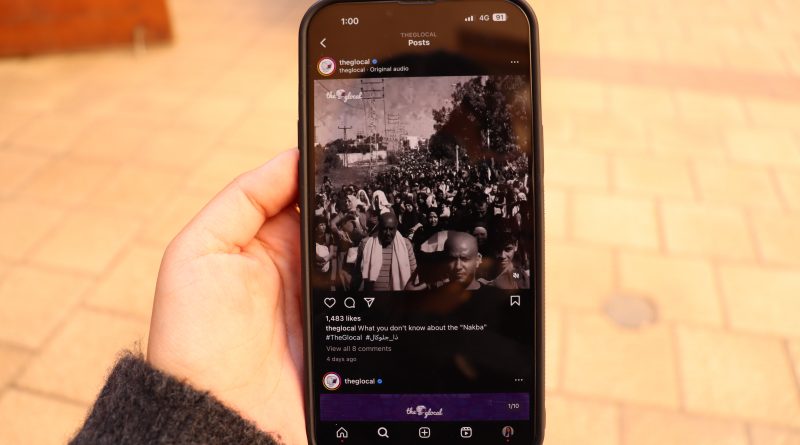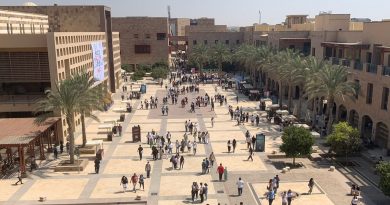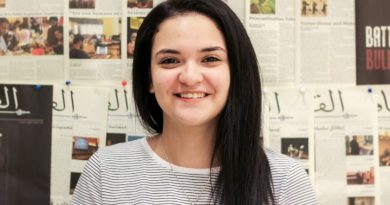The Role Of Social Media In Changing Perceptions
As soon as the war broke out on October 7, the one thing Arabs felt they could do was to spread awareness on what was happening in Gaza in the hopes of countering the mainstream narrative in the West and with that, hopefully, sway a few minds.
Edited By: Judith Uttendorfer
Photo Take By: Noha Naguib
There are two sides to every story, and people normally support one over the other, especially when mainstream media highlights that side.
Yet, social media has harnessed the power of the narrative, and has played a significant role in changing people’s perspectives on the Israeli-Palestinian issue since the beginning of October. Despite the algorithm often emphasizing posts resonating with the user’s existing beliefs, social media videos, images and stories coming out of Gaza that show the situation on the ground, as well as simplified informational videos explaining the history and the context made many people question what they had always believed to be true and factual. It had been a bumpy ride for most users, with the platforms blocking many posts and suspending various accounts. But the social media momentum has paid off in showing an untold side of the truth.
Raphael Mimoun is one of the people who found his reality crashing down as what he knew and what he saw contradicted each other.
“I grew up in a Zionist household, spent 12 years in a Zionist youth movement, lived four years in Israel, and have friends and family who served in the Israeli Defense Forces. When that is your world, it’s hard to see apartheid when it’s happening,” he explains.
Mimoun grew up in France in a Jewish community, where unconditional support for Israel was expected, especially since the only narrative he heard of was the survival of Jews. He heard over and over that Palestine was a largely deserted piece of land before Jewish people settled in. The terms “apartheid” and “occupation” were never mentioned.
In parallel, the dominating narrative in his circle was that Arabs turned down all Israeli and US peace offers and were unwilling to share the land as the Israeli people had wished.
Mimoun thinks that Israelis who have grown up to the same ideas simply see their actions as self-defense, especially since, from their point of view, it is the Palestinians’ fault for not agreeing on peace in the first place.
“Israelis are not able to empathize with Palestinians; they aren’t able to comprehend Palestinian suffering,” he elaborates.
But he started consuming a counter narrative on social media; he came across posts about the ongoing war explaining the conflict and the history through simplified TikTok videos. Mimoun quickly realized that the historical narrative he was given was completely divorced from reality or the other side of the story.
Likewise, Lori, who prefers to keep her last name anonymous, started rethinking her stance on the situation. Lori is a German citizen who grew increasingly doubtful about her stance after seeing social media content about what was happening on the ground in Gaza.
Her beliefs started to shift as she watched comedian Bassem Youssef’s segment with presenter Piers Morgan where he talked in-depth about the situation in Palestine and the roots of occupation.
“I have a very annoying feeling about how we were [tricked] and lied to by our politicians about what was happening there. Moreover, social media algorithms increased the gap by showing each side only what they want to see,” she explains.
Lori doesn’t consider herself pro-Palestine, as she’s not fully aware of the history, but she’s definitely not pro-Israel either and firmly believes she’s been lied to by the traditional media.
Although many people changed their once-set minds and started seeing a more balanced narrative through social media, there is also often ongoing discrimination against Palestininans and Arabs.
“It’s true some started seeing the Arabs from a more acceptable and loving perspective and others started hating us openly,” says Nathalya Maurice, an Egyptian who lives in the US and has worked there for 10 years.
Since October 7, she started feeling a shift in her day-to-day contact with people.
“It felt like now they have a reason or a justification to hate us,” she says.
At first, Maurice viewed these racist actions as an individual coincidence, but after a long series of “individual coincidences” she quickly realized that she’s not the only one facing racism as her parents were facing the same problem, along with most arabs living abroad she spoke with.
Maurice agrees that social media helped the Arabs gain more voices and support, yet there is another side of the coin that only those living abroad can see.
“It’s not a coincidence that in 10 years, I was never discriminated against, and now all of a sudden, my parents, brother, and I are facing hatred everywhere,” she says.



